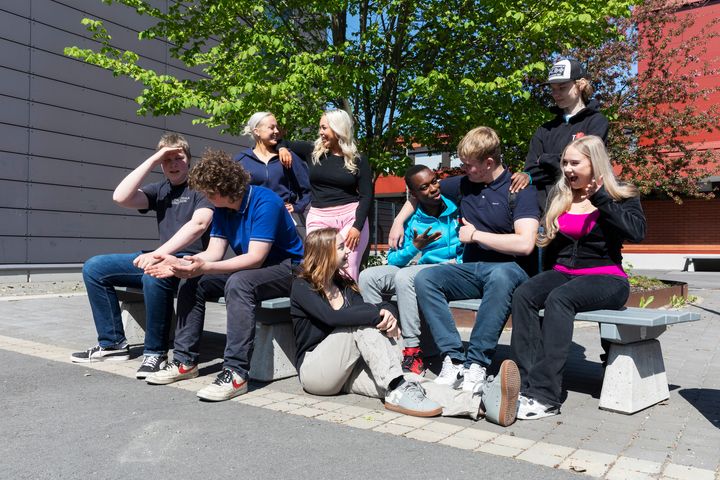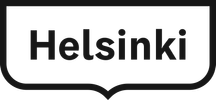The Helsinki Learns – Future Competences vision has guided our work for one year: Reading Wheel, language awareness, and cross-studying
The strategic guidelines of education can be seen through many actions in the daycare centres, schools and upper secondary schools in Helsinki, as well as the Helsinki Vocational College and Adult Institute (Stadin AO).

During the current council period, Helsinki has created the strategic objectives for developing education until 2030. The Helsinki Learns – Future Competences vision runs across the four-year council periods as a part of the strategy, budget, operating plans, and overall development within the Education Division.
The objectives were constructed in cooperation with approximately 1,000 employees and almost 4,000 learners and guardians, and they were published in February 2024. More than a year later, it is now time to examine how Helsinki’s daycare centres, schools and educational institutions promote reaching these objectives.
‘It is important to gather information directly from our various units on the tangible actions taken in order to reach the goals defined together. For example, how we can strengthen children’s literacy or promote equal learning’, says Head of Division Satu Järvenkallas.
Literacy work for everyone, starting in daycare
In its vision, Helsinki promised to strengthen the key competences and skills of learners. All of the City’s Finnish and Swedish-language daycare centres have now introduced the Reading Wheel and strengthened the model of an adult who reads.
‘The Reading Wheel is a tool for early childhood education employees to assess what should be read and how to read it for the children and how books are made available to the children,’ says Itinerant Early Childhood Education Special Needs Teacher Sari Kumin.
Together with Finnish as a Second Language Teacher Marjaana Gyekye, she has developed the Reading Wheel. The wheel has five sectors for daycare professionals to discuss to find out which stage their group of children has reached in reading. The core of the wheel shows the minimum requirements and the outermost layer shows high-quality activities promoting literacy.
With small children, literacy work starts by looking at picture books and proceeds to how multicultural stories are read in the group.
‘I feel that the reading wheel is one of the most significant individual methods for balancing the differences in reading caused by the different backgrounds of the children. When we know how strongly reading is connected to success at school, we also know we can truly make a difference by getting a child interested in reading. Reading also enriches the imagination and affects a child’s behaviour and self-regulation; how the child is able to listen and concentrate,’ Kumin says.
The Reading Wheel allows the group to find out more about everyday matters, the world of the children, as well as different cultures and families through books.
‘Reading books which the children can relate to already in daycare is important, as it allows us to understand each other better.’
The Reading Wheel is also used in the first two grades in basic education.
Working towards equal learning
One of the objectives of the Future Competences vision is to work to promote equal learning. That is why Helsinki has strengthened language-aware education in its comprehensive schools and introduced a new S1/S2 syllabus selection process.
‘The personnel and guardians are intensively informed about the differences between learning Finnish as a first or second language. If a child uses Finnish well, the S1 syllabus is used,’ says Principal Maria Uutaniemi from Pasila Comprehensive School.
Pasila Comprehensive School does not have separate groups for Finnish as a second language teaching; the support is brought to the classroom. Of the 900 students of the school, 12 per cent use the S2 syllabus. Guardians are encouraged to view Finnish as the first school language even though other languages are used at home.
‘We examine language selections closely with all our students and their guardians,’ Uutaniemi says.
Some schools have previously used a more direct interpretation where any student whose first language is anything other than Finnish will automatically study according to the Finnish as a second language syllabus.
‘We are now examining the students’ true language proficiency. We try to engage with the guardians. They are the ones making the S1/S2 decision when enrolling their child at school, but the matter can be reassessed as soon as the term begins and we get to know the children.’
The new S1/S2 syllabus selection process is increasingly equal, open, and transparent, which makes it more useful for the students.
‘It is good for the children and young people to see the kinds of decisions we make in instructing them. They should know that they are not somehow separated from others simply because they have a different background. We are very firmly together and we share the same teaching, books, assignments, and objectives. Language awareness is important for us,’ the principal emphasises.
Cross-studying in upper secondary education
In order to promote equal learning, Helsinki started to offer cross-studying for all students in the City’s upper secondary schools and Helsinki Vocational College in 2024. The studies will be recognised as part of the student’s own qualification, and so far, there have been approximately one hundred cross-studying records.
‘For example, we organised the Photo Voice course with Visual Communication Teacher Tom Serratti at Helsinki Vocational College. It is an art-based study method which can be used as a tool for influencing and particiaption,’ says Project Planner Sanna Kattelus-Mäkiaho, the other teacher for the course.
Photo Voice has been organised as cross-studies twice, and there have been participants from five upper secondary schools. The two credit course can be recognised as a visual arts project, for example.
‘Students have been asked questions related to accessibility and learning support, and they have responded through photos and small caption analyses. We organised an exhibition of the results at the Education Division’s building so that decision-makers could see them.’
Helsinki Vocational College students receive credits through designing, creating the visual look for, and printing the materials produced by the upper secondary students.
Another example of cross-studies is the intro to the JA Company Program, led by upper secondary school and Helsinki Vocational College teachers together. The course has been organised twice.
‘The study unit is based on materials by Junior Achievement (JA) Finland and the JA Company Program learning materials. The students have learned about entrepreneurship and gotten to know entrepreneurs in different kinds of learning environments, and the feedback on the new form of teaching has been inspiring,’ says Project Specialist Ida Orellana.
Due to cross-studying, upper secondary students have been able to attend security officer basic traning from the Helsinki Vocational College course selection, for example. They have also been able to choose courses at Finnish and Swedish adult education centres, which will also be open to Helsinki Vocational College students starting next autumn. Language studies have been particularly popular.
‘In their feedback, students have said that cross-studying has brought them more alternatives and improved their wellbeing, and that they have been able to strengthen skills necessary for working life and further studies,’ Orellana and Kattelus-Mäkisalo say.
Read more about the key success stories of the Helsinki Learns – Future Competences vision in the status update on the City’s website (in Finnish).
Avainsanat
Yhteyshenkilöt
Marjo KyllönenDevelopment Services Director
Puh:+358503763461marjo.kyllonen@hel.fiNina DaleCommunications Specialist
Puh:+358 9 310 23875nina.dale@hel.fiKasvatuksen ja koulutuksen toimiala huolehtii Helsingin kaupungin varhaiskasvatuksesta, esiopetuksesta, perusopetuksesta ja lukiokoulutuksesta, suomenkielisestä ammatillisesta koulutuksesta sekä vapaasta sivistystyöstä. Seuraa meitä @HelsinkiOppii, @tyovaenopisto, @Hforsarbis ja @StadinAO
Tilaa tiedotteet sähköpostiisi
Haluatko tietää asioista ensimmäisten joukossa? Kun tilaat tiedotteemme, saat ne sähköpostiisi välittömästi julkaisuhetkellä. Tilauksen voit halutessasi perua milloin tahansa.
Lue lisää julkaisijalta Helsingin kaupunki, kasvatuksen ja koulutuksen toimiala
Kasvatus- ja koulutuslautakunnan suomenkielisen jaoston päätöstiedote 24.6.202524.6.2025 19:10:06 EEST | Tiedote
Kasvatus- ja koulutuslautakunnan suomenkielisen jaoston tiistaina 24. kesäkuuta pidetyn kokouksen päätöstiedote löytyy toimialan verkkosivuilta samoin kuin esityslista. Päätöstiedote Esityslista
Beslutsmeddelande: Svenska sektionen vid nämnden för fostran och utbildning sammanträdde i kväll 24.6.202524.6.2025 18:20:45 EEST | Pressmeddelande
Protokollet finns på sektorns webbplats.
Ennakkotiedote: Helsingin kasvatus- ja koulutuslautakunnan suomenkielinen jaosto kokoontuu tiistaina 24.6.202519.6.2025 15:12:41 EEST | Tiedote
Kasvatus- ja koulutuslautakunnan suomenkielinen jaosto kokoontuu tiistaina 24. kesäkuuta klo 16.30. Jaoston esityslistalla on muun muassa päätösesitys Helsingin esiopetuksen opetussuunnitelmasta 1.8.2025 alkaen sekä päätösesitys esiopetuksen toimipaikoista toimintavuodelle 2025-2026. Lisäksi jaosto käsittelee päätöstä Helsingin kaupungin suomenkielisen perusopetuksen opetussuunnitelman lukujen 1–8 muuttamisesta. Näihin ja muihin kokouksen esityksiin pääsee tutustumaan kasvatuksen ja koulutuksen verkkosivuilla. Jaoston kokouksen päätöstiedote julkaistaan kokouksen päätyttyä toimialan verkkosivuilla.
Päätöstiedote kasvatus- ja koulutuslautakunnan kokouksesta 17.6.17.6.2025 19:42:57 EEST | Tiedote
Lautakunnan tiistaina 17. kesäkuuta pidetyn kokouksen päätöstiedote on julkaistu kasvatuksen ja koulutuksen toimialan verkkosivuilla. Kokouksen esityslista on saatavilla toimialan verkkosivuilta.
Från och med augusti kommer Helsingfors grundskolor att ha nya riktlinjer för elevernas användning av smarttelefoner och andra mobila enheter16.6.2025 08:44:25 EEST | Pressmeddelande
De ändringar i lagen om grundläggande utbildning som begränsar användningen av telefoner och andra mobila enheter träder i kraft den 1 augusti 2025. Med mobila enheter avses bland annat smarttelefoner, pekdatorer, smartklockor och hörlurar. I Helsingfors stads skolor har det redan tidigare varit förbjudet att använda telefoner under lektionerna. I förskolan behöver eller använder barnen inte egna smarta enheter.
Uutishuoneessa voit lukea tiedotteitamme ja muuta julkaisemaamme materiaalia. Löydät sieltä niin yhteyshenkilöidemme tiedot kuin vapaasti julkaistavissa olevia kuvia ja videoita. Uutishuoneessa voit nähdä myös sosiaalisen median sisältöjä. Kaikki tiedotepalvelussa julkaistu materiaali on vapaasti median käytettävissä.
Tutustu uutishuoneeseemme